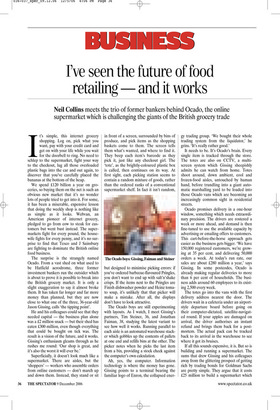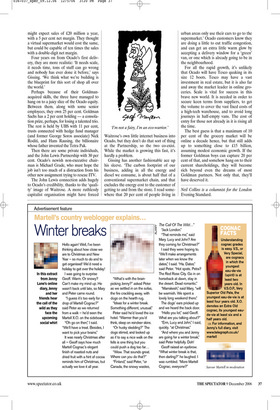I’ve seen the future of food retailing — and it works
Neil Collins meets the trio of former bankers behind Ocado, the online supermarket which is challenging the giants of the British grocery trade It’s simple, this internet grocery shopping. Log on, pick what you want, pay with your credit card and get on with your life while you wait for the doorbell to ring. No need to schlep to the supermarket, fight your way to the checkout, lug all those overloaded plastic bags into the car and out again, to discover that you’ve carefully placed the bananas at the bottom of the heap.
We spend £120 billion a year on groceries, so buying them on the net is such an obvious new market that it’s no wonder lots of people tried to get into it. For some, it has been a miserable, expensive lesson that doing the weekly shop is nothing like as simple as it looks. Webvan, an American pioneer of internet grocery, pledged to go from cow to steak for customers but went bust instead. The supermarkets fight for every pound, the housewife fights for every penny, and it’s no surprise to find that Tesco and J Sainsbury are fighting to dominate the British online food business.
The surprise is the strangely named Ocado. From a vast shed on what used to be Hatfield aerodrome, three former investment bankers run the outsider which is about to prove it is possible to break into the British grocery market. It is only a slight exaggeration to say it almost broke them. It has taken far longer and far more money than planned, but they are now close to what one of the three, 36-year-old Jason Gissing, calls ‘the tipping point’.
He and his colleagues could see that they needed capital — the business plan alone was a £2 million snack — but their shed has eaten £300 million, even though everything that could be bought on tick was. The result is a vision of the future, and it works. Gissing’s enthusiasm gleams through as he rushes me round: ‘Our shop is great, and it’s also the worst it will ever be.’ Superficially, it doesn’t look much like a supermarket. There are aisles, but the ‘shoppers’ — workers who assemble orders from online customers — don’t march up and down them. Instead, they stand or sit in front of a screen, surrounded by bins of produce, and pick items as the shopping baskets come to them. The screen tells them what’s wanted, and where to find it. They beep each item’s barcode as they pick it, just like any checkout girl. The ‘tote’, as the brightly-coloured plastic box is called, then continues on its way. At first sight, each picking station seems to contain a random mixture of goods, rather than the ordered ranks of a conventional supermarket shelf. In fact it isn’t random, but designed to minimise picking errors: if you’ve ordered barbecue-flavoured Pringles, you don’t want to end up with salt’n’shake crisps. If the items next to the Pringles are Finish dishwasher powder and Heinz tomato soup, it’s unlikely that that picker will make a mistake. After all, the displays don’t have to look attractive.
The Ocado boys are still experimenting with layouts. As I watch, I meet Gissing’s partners, Tim Steiner, 36, and Jonathan Faiman, 38, studying the latest variant to see how well it works. Running parallel to each aisle is an automated warehouse stacker which gobbles up the contents of pallets at one end and refills bins at the other. The picker notes when he picks the last item from a bin, providing a stock check against the computer’s own calculation.
Ah, yes, the computer. Information technology is where the money has gone. Gissing points to a terminal bearing the familiar logo of Enron, the collapsed ener gy trading group. ‘We bought their whole trading system from the liquidator,’ he grins. ‘It’s really rather good.’ It needs to be. It’s Ocado’s brain. Every single item is tracked through the store. The totes are also on CCTV, a multiscreen system which Gissing sheepishly admits he can watch from home. Totes shoot around, down ambient, cool and frozen-food aisles, untouched by human hand, before trundling into a giant automatic marshalling yard to be loaded into those Ocado vans which are becoming an increasingly common sight in residential streets.
Ocado promises delivery in a one-hour window, something which needs extraordinary precision. The drivers are rostered a week or more ahead, and demand is then fine-tuned to use the available capacity by advertising or emailing offers to customers. This cart-before-the-horse approach gets easier as the business gets bigger. ‘We have 150,000 registered customers, we’re growing at 35 per cent, and delivering 50,000 orders a week. At today’s run rate, our sales are about £280 million a year,’ says Gissing. In some postcodes, Ocado is already making regular deliveries to more than 6 per cent of households. The business adds around 60 employees to its existing 2,500 every week.
The totes go into the vans with the first delivery address nearest the door. The drivers wait in a cafeteria under an airportstyle departure board before going on their computer-dictated, satellite-navigated round. If your apples are damaged on arrival, the driver authorises an instant refund and brings them back for a postmortem. The actual pack can be tracked back to its arrival in the warehouse to see where it got its bruises.
If all this sounds expensive, it is. But so is building and running a supermarket. The sums that drew Gissing and his colleagues away from the glittering prospect of getting rich by trading bonds for Goldman Sachs are pretty simple. They argue that it costs £25 million to build a supermarket which might expect sales of £20 million a year, with a 5 per cent net margin. They thought a virtual supermarket would cost the same, but could be capable of ten times the sales with a double-digit net margin.
Four years on from Ocado’s first delivery, they are more realistic: ‘It needs scale, it needs time, tons of stuff can go wrong and nobody has ever done it before,’ says Gissing. ‘We think what we’re building is the blueprint for this sort of shop all over the world.’ Perhaps because of their Goldmanacquired skills, the three have managed to hang on to a juicy slice of the Ocado equity. Between them, along with some senior employees, they own 25 per cent. Goldman Sachs has a 2 per cent holding — a consolation prize, perhaps, for losing a talented trio. The rest is held by UBS with 11 per cent, trusts connected with hedge fund manager (and former George Soros associate) Nick Roditi, and Hans Rausing, the billionaire whose father invented the Tetra Pak.
Then there are some private individuals, and the John Lewis Partnership with 30 per cent. Ocado’s newish non-executive chairman is Michael Grade, who must hope the job isn’t too much of a distraction from his other new assignment trying to rescue ITV.
The John Lewis connection adds hugely to Ocado’s credibility, thanks to the ‘quality’ image of Waitrose. A more ruthlessly capitalist organisation might have forced Waitrose’s own little internet business into Ocado, but they don’t do that sort of thing at the Partnership, so the two co-exist. While the market is growing this fast, it’s hardly a problem.
Gissing has another fashionable ace up his sleeve. ‘The carbon footprint of our business, adding in all the energy and diesel we consume, is about half that of a conventional supermarket chain, and that excludes the energy cost to the customer of getting to and from the store. I read somewhere that 20 per cent of people living in urban areas only use their cars to go to the supermarket.’ Ocado customers know they are doing a little to cut traffic congestion, and can get an extra little warm glow by accepting a delivery window for a ‘green’ van, or one which is already going to be in the neighbourhood.
For all the rapid growth, it’s unlikely that Ocado will have Tesco quaking in its size 12 boots. Tesco may have a vast investment in real estate, but it is also far and away the market leader in online groceries. Scale is vital for success in this brave new world. It is needed in order to secure keen terms from suppliers, to get the volume to cover the vast fixed costs of a high-tech warehouse, and to avoid long journeys in half-empty vans. The cost of entry for those not already in it is rising all the time.
The best guess is that a maximum of 10 per cent of the grocery market will be online a decade hence, but that still adds up to something close to £15 billion, assuming modest economic growth. If the former Goldman boys can capture 20 per cent of that, and somehow hang on to their current shareholdings, they will become rich beyond even the dreams of most Goldman partners. Not only that, they’ll have deserved it.
Neil Collins is a columnist for the London Evening Standard.



























































































 Previous page
Previous page